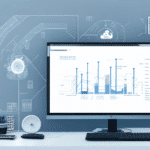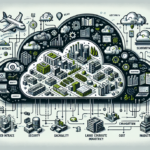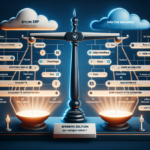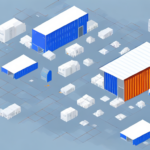Infor CloudSuite Industrial (SyteLine) vs. NetSuite ERP: An In-Depth Comparison
Choosing the right Enterprise Resource Planning (ERP) system is crucial for optimizing business processes and enhancing productivity. Infor CloudSuite Industrial (SyteLine) and NetSuite ERP are two prominent ERP solutions that cater to different business needs. This guide provides a comprehensive analysis of both systems to help businesses make an informed decision.
Deployment and Infrastructure
Deployment Models
- Infor CloudSuite Industrial: Primarily offers on-premises deployment, allowing companies to install the software on their own servers.
- NetSuite ERP: Fully cloud-based, accessible via web browsers without the need for on-premises infrastructure.
Impact on IT Infrastructure
The choice between on-premises and cloud deployment affects scalability, maintenance, and IT resource allocation. Cloud-based systems like NetSuite offer greater flexibility and easier scalability, while on-premises solutions like Infor may require more significant IT investment.
Target Markets and Industry Suitability
Target Industries
- Infor CloudSuite Industrial: Tailored for manufacturing and distribution sectors, including aerospace, automotive, and industrial machinery.
- NetSuite ERP: Suitable for a wide range of industries, from small startups to large enterprises across various sectors.
Industry-Specific Features
Infor CloudSuite Industrial offers specialized features for complex manufacturing processes, while NetSuite provides versatile tools adaptable to diverse business models.
Feature Comparison
Supply Chain Management
- Infor CloudSuite Industrial: Advanced capabilities in demand planning, inventory optimization, and production scheduling.
- NetSuite ERP: Robust supply chain features complemented by strong CRM tools.
User Interface
- Infor CloudSuite Industrial: Traditional, highly customizable desktop-based interface.
- NetSuite ERP: Modern, intuitive web-based interface enhancing user adoption.
Integration Capabilities
- Infor CloudSuite Industrial: Open architecture facilitating seamless integration with third-party systems.
- NetSuite ERP: Integrated platform with extensive APIs for third-party integrations, though sometimes requiring additional customization.
Pricing Models
Cost Structure
- Infor CloudSuite Industrial: Generally involves higher upfront costs due to customization and on-premises infrastructure requirements.
- NetSuite ERP: Offers flexible pricing with subscription-based models, making it accessible for businesses of various sizes.
Total Cost of Ownership
While Infor may require substantial initial investment, NetSuite's scalable pricing can lead to lower overall costs, especially for growing businesses.
Pros and Cons
Infor CloudSuite Industrial
- Pros: Highly customizable, robust manufacturing features, strong supply chain management.
- Cons: Higher cost, complex implementation, requires significant IT resources.
NetSuite ERP
- Pros: User-friendly interface, flexible pricing, extensive integration capabilities.
- Cons: Limited customization compared to Infor, potential additional costs for integrations.
Implementation and Support
Implementation Timeframes
- Infor CloudSuite Industrial: Typically longer implementation periods, especially for larger organizations with complex requirements.
- NetSuite ERP: Faster deployment due to cloud-based architecture and streamlined processes.
Customer Support
- Infor CloudSuite Industrial: Comprehensive support options including phone, email, and dedicated account managers.
- NetSuite ERP: Extensive support resources, including a knowledge base, online support, and customer forums.
Scalability and Flexibility
Scalability
- Infor CloudSuite Industrial: Highly scalable for large manufacturing operations, with the ability to handle complex processes.
- NetSuite ERP: Easily scalable for businesses of all sizes, from startups to large enterprises.
Customization Options
- Infor CloudSuite Industrial: Extensive customization capabilities tailored to specific industry needs.
- NetSuite ERP: Offers customizable fields, workflow rules, and integration with third-party tools.
Security Features
Data Protection
- Both Infor CloudSuite Industrial and NetSuite ERP implement robust security measures, including data encryption, access controls, and role-based permissions.
Compliance
Companies must consider regulatory compliance requirements when choosing between on-premises and cloud-based solutions. NetSuite's cloud infrastructure often meets global compliance standards, while Infor may offer tailored solutions for specific regulatory needs.
Conclusion: Which ERP is Right for Your Business?
The decision between Infor CloudSuite Industrial (SyteLine) and NetSuite ERP hinges on your company's specific needs, industry, and operational requirements. Infor excels in manufacturing and complex supply chain management, offering deep customization for specialized processes. Conversely, NetSuite provides a versatile, scalable solution with a user-friendly interface suitable for a broad spectrum of industries.
For businesses seeking extensive manufacturing capabilities and willing to invest in a robust, customizable system, Infor CloudSuite Industrial is a strong contender. On the other hand, companies looking for a flexible, cloud-based ERP with quick deployment and scalability may find NetSuite ERP to be the better fit.
It's essential to conduct a thorough needs assessment and possibly engage with ERP consultants to evaluate which system aligns best with your strategic goals.
For more insights on ERP systems, refer to industry reports from reputable sources such as Gartner and Forrester.






















